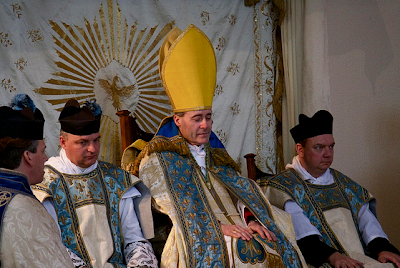I typically do not blog on the controversy and news surrounding the so-called "Doctrinal Discussions" that have taken place between the Society of St. Pius X and Roman Officials these past few years. However, in light of the request by the Society for fervent prayers over these intentions, I wish to offer a few brief comments.
The issue of "full communion" is nothing more than a trojan horse. Does the Society at this time still exercise valid Sacraments through supplied jurisdiction? Yes, they do. While full communion is ideal, at what cost? Does this mean the Society must abandon the Faith and begin teaching and preaching ecumenism, collegiality, or religious liberty? Does it mean that the Society must start offering the Novus Ordo or at least cease in calling it a neo-protestant Liturgy impregnated with the spirit of protestantism?
How is it that Bishops that support homosexuality (like Cardinal Martini) are in full Communion with the Bride of Christ but somehow the SSPX is not? How is it that priests that have "gay" Masses, bring dogs and circus animals into the sanctuary, or teach that Christ our Lord never rose again are in full Communion? But somehow these "priests" are not disciplined while the Society is treated as a disease.
"For there is no good tree that bringeth forth evil fruit; nor an evil tree that bringeth forth good fruit" (Lue 6:43)
There can be no compromise without a doctrinal agreement (and it is not possible at this time) - and it is on that topic which I offer recent comments by His Excellency Bishop Richard Williamson. May God bless and guard him!
Number CCXLVI (246) | 31 March 2012 | |
GRAVE DANGER | ||
The desire of certain priests within the Society of St Pius X to seek a practical agreement with the Church authorities without a doctrinal agreement seems to be a recurring temptation. For years Bishop Fellay as the Society’s Superior General has refused the idea, but when he said in Winona on February 2 that Rome is willing to accept the Society as is, and that it is ready to satisfy “all the Society’s requirements...on the practical level”, it does look as though Rome is holding out the same temptation once more. However, the latest news from Rome will be known to many of you: unless the Vatican is playing games with the SSPX, it announced last Friday, March 16, that it found Bishop Fellay’s January reply to its Doctrinal Preamble of September 14 of last year “not sufficient to overcome the doctrinal problems which lie at the foundation of the rift between the Holy See and the SSPX.” And the Vatican gave the SSPX one month in which to “clarify its position” and avoid “a rupture of painful and incalculable consequences.” But what if Rome were suddenly to cease requiring acceptance of the Council and the New Mass ? What if Rome were suddenly to say, “Alright. We have thought about it. Come back into the Church as you ask. We will give you freedom to criticize the Council as much as you like, and freedom to celebrate the Tridentine Mass exclusively. But do come in !” It might be a very cunning move on the part of Rome, because how could the Society refuse such an offer without seeming inconsistent and downright ungrateful ? Yet on pain of survival it would have to refuse. On pain of survival ? Strong words. But here is a commentary of Archbishop Lefebvre on the matter. On May 5, 1988, he signed with then Cardinal Ratzinger the protocol (provisional draft) of a practical Rome-Society agreement. On May 6 he took back his (provisional) signature. On June 13 he said, “With the May 5 Protocol we would soon have been dead. We would not have lasted a year. As of now the Society is united, but with that Protocol we would have had to make contacts with them, there would have been division within the Society, everything would have been a cause of division” (emphasis added). “New vocations might have flowed our way because we were united with Rome, but such vocations would have tolerated no disagreement with Rome which means division. As it is, vocations sift themselves before they reach us” (which is still true in Society seminaries). And why such division ? (Warring vocations would be merely one example amongst countless others). Clearly, because the May 5 Protocol would have meant a practical agreement resting upon a radical doctrinal disagreement between the religion of God and the religion of man. The Archbishop went on to say, “They are pulling us over to the Council...whereas on our side we are saving the Society and Tradition by carefully keeping our distance from them” (emphasis added). Then why did the Archbishop seek such an agreement in the first place ? He continued, “We made an honest effort to keep Tradition going within the official Church. It turned out to be impossible. They have not changed, except for the worse.” And have they changed since 1988 ? Many would think, only for yet worse. Kyrie eleison. | ||












